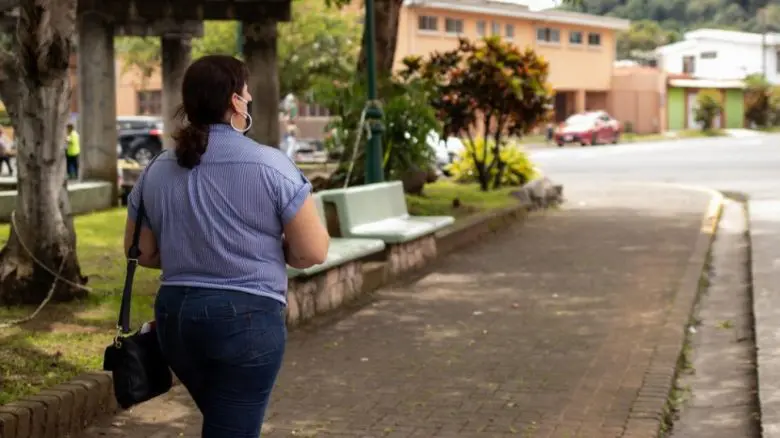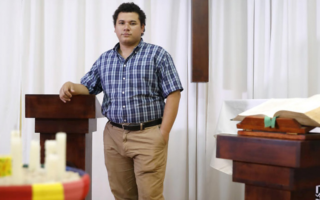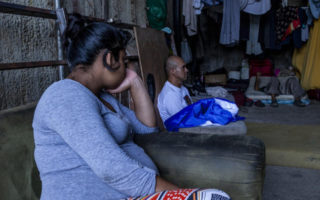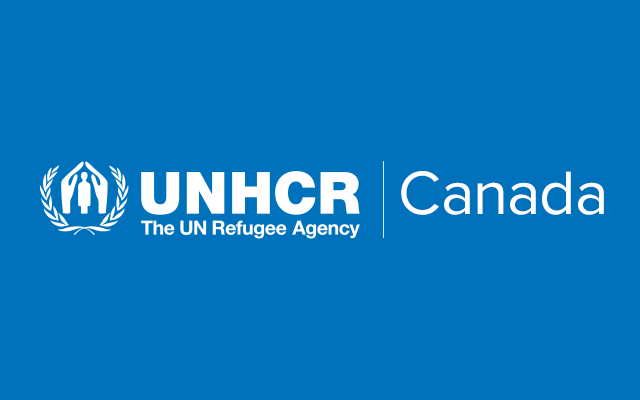
Catalina, a Nicaraguan refugee, on her way to deliver food kits to people in need in her host country, Costa Rica. © UNHCR/Luis Roberto Solano Vargas
For Catalina, seeking medical care in Nicaragua was too risky. In Costa Rica it was unaffordable – until she became one of 6,000 refugees given access to the public health care system.
It had been many years since Catalina* had finished her law degree when fear for her family’s safety and anger over what was happening in her native Nicaragua compelled her to move in with protesting students on a university campus as part of mass antigovernment demonstrations in 2018.
One night, a homemade explosive was lobbed through the window and detonated on her right foot.
Though she underwent surgery to save her foot, the serious injuries she sustained in the explosion required extensive treatment. Fearing she could be targeted for abduction, Catalina often used disguises when she went for appointments with her doctors. Eventually, the fear of being detained for her role in the protests led her to flee across the border to neighboring Costa Rica, where she applied for asylum.
Her wounds festering, and unable to afford a doctor in Costa Rica, she went without treatment for several months – running the risk of becoming permanently disabled. Then she heard of an initiative by UNHCR, the UN Refugee Agency, that gives 6,000 refugees and asylum seekers access to Costa Rica’s robust public health system.
“When I heard of the medical insurance provided by UNHCR, it was a blessing,” said Catalina, a 44-year-old lawyer and mother of two.
Initially spearheaded by students and the elderly, the wave of demonstrations in Nicaragua in 2018 quickly garnered support from white collar professionals like Catalina, including teachers, doctors and journalists, as well as farmers. The UN High Commissioner for Human Rights estimates that more than 300 demonstrators were killed in the protests.
“When I heard of the medical insurance provided by UNHCR, it was a blessing.”
Catalina felt compelled to become involved and opened her house as a makeshift aid centre for protesters, where she and others fed and clothed demonstrators and dispensed basic first aid. But her act of solidarity soon also turned her into a target for retaliation.
To escape possible attacks and avoid putting her two teenage daughters in danger, Catalina joined protesters on the campus of a nearby university. One night, while she and other demonstrators were sleeping in a classroom, a loud noise awoke her. She went to the window to see what it was. A homemade explosive went in through the window and exploded on her, destroying half of her foot.
“I was bleeding and they carried me … to the hospital,” she said. “A block away from the car I began feeling cold and thought I would die. One of the young men kept telling me to stay away from the light. I thought only of my daughters.”
At the hospital, she underwent surgery and was swiftly released because the medical staff feared that those who were behind the attack might track her down. Still, her wounds required continued treatment, so for several months, she dyed her hair or wore hats in a bid to keep from being identified and detained.
But Catalina suspected that paramilitary groups were closing in on her. She felt her only chance to survive was to flee Nicaragua. She bundled up a few belongings and, despite her still-unhealed wounds, managed to cross the Central American nation’s southern land border into Costa Rica, all alone.
She is one of more than 100,000 Nicaraguans estimated to have fled persecution and human rights violations in the wake of the protest movement. Like her, more than 86,000 of them have sought protection in Costa Rica.
While she had managed to escape danger, Catalina was still struggling with her injuries. Without a job, she was not able to afford medical care in Costa Rica. And as a refugee, with no medical insurance, she was not able to access the country’s public health system.
“I began feeling cold and thought I would die …. I thought only of my daughters.”
But an agreement signed between the Costa Rican Social Security System and UNHCR changed that for Catalina and thousands of others like her. The agreement extended coverage under the country’s public health system to 6,000 extremely vulnerable refugees and asylum seekers.
María José Barth Vega, UNHCR’s public health officer in Costa Rica, underscored that people forced to flee their homelands often tend to suffer from chronic ailments that require long-term care, adding that the stresses of leaving home sometimes make their conditions worse.
“Many refugees and asylum-seekers have injuries and trauma that require urgent medical attention. Effective access to health services is a must for them to rebuild their lives with dignity,” she explained.
The initiative has taken on even greater importance amid the COVID-19 pandemic, which has hit the Americas particularly hard. As a result, UNHCR tweaked the program to also target refugees and asylum seekers who face higher risks due to the coronavirus, such as the elderly.
Thanks to the programme, Catalina was able to resume her treatment. As her physical injuries have healed, so too have the emotional scars.
Catalina is now back to what she most enjoys: helping others. Working with a religious organization and other Nicaraguans in Costa Rica, she has helped organize initiatives to provide aid to the homeless and other vulnerable people in her host country.
“Helping others helps me,” she said.
*Name changed for protection reasons.
Originally published by UNHCR on 25 August 2020





